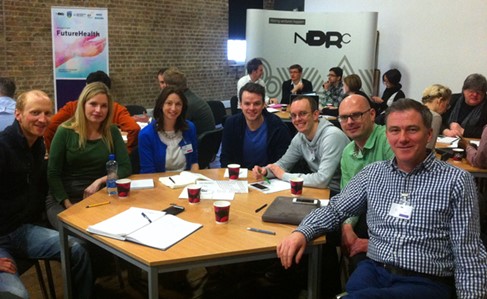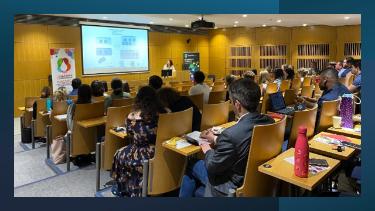Futurehealth: Innovation to Revolutionise Healthcare

Pictured (L to R): Futurehealth OncoNamics team - Stephen O'Brien, Helen Rea, Nuala Hannon, Paddy Dennis, Dirk Fey, Maciej Dobrzynski, Colm Lynam
Dr Dirk Fey, Research Fellow at SBI, is one of 10 idea owners who yesterday completed the NDRC/UCD FutureHealth pre-accelerator programme. Here he gives his perspective on how the programme is addressing challenges in healthcare.
Imagine going to the doctor in the future, maybe 20 years from now – what would that look like?
Realistically, the way healthcare has been delivered has not changed essentially in the last two decades. You go to the doctor, he talks to you, does some tests, and then makes a decision about diagnosing and treating or referring you. Essentially, it is him/her making the decision; the doctor is integrating the information available to them to make the best possible choice for you.
The world however has changed, transformed by the emerging technologies of the information age. In any other area, we have adapted to this change, even embraced these technologies. Yet, delivery of the health services has moved little. The term 'evidence based medicine' for example was only introduced late the 90s. In terms of innovation, health is lagging behind other areas.
But the world of medicine is changing too. This is the information age. New science emerges all the time, massive amounts of data, information and knowledge are generated every day. Now we have reached a singular moment at which it is no longer possible for doctors, however specialized they might be, to keep up with this 'information overflow'. They too will have to embrace the brave new world.
Better ways of integrating information and synthesizing knowledge are needed. We simply cannot expect a doctor to keep track of all the research, clinical trials and published data when more than 20,000 clinical trials get registered each year (source: clinicaltrials.gov).
The personalization of this aggregate data is done by your physician. He is the one who takes your very personal history into account when making a decision. But there must be a better way to contextualize all the available information and research knowledge 'out there', other than 'in your head' (in your physician's head).
This is what OncoNamics is about; better integration of biological and clinical data in the field of oncology. Based on the algorithms and models built in System Biology Ireland, we are developing personalised chemotherapy prediction tools that help oncologists and their patients to make well-informed, truly personalised decisions. We believe that by simulating the dynamic signalling behaviour of cancer cells in each individual patient, we can calculate the patient’s probability to respond to chemotherapy. This goes beyond a static snapshot of a tumour’s genomics, but offers unprecedented insight into the dynamic behaviour of the tumour cells.
And we as OncoNamics are not alone. There are nine other teams in FutureHealth; each putting their very own innovative and disruptive ideas forward. These ideas have the potential to not only improve patient outcomes and patient experiences, but also to make the health services more effective and less expensive.
Being part of this is very exciting. During the FutureHealth sessions at the NDRC one can feel that there something is in the air. I get the unmistakable feeling that the time is ripe, ripe for some disruption bringing health services into the 21 century.
FutureHealth is an eight-week, part-time ‘pre-accelerator’ programme. The NDRC is working with 10 teams to validate high impact ideas that have the potential to be transformed into investable high impact new ventures that will change the future of health.

